Do you *have* to believe in a young Earth to take the Bible literally as a Christian?
No. You do not. You certainly do not. You can, but you don’t have to…and taking the old Earth view *just might be* a better reading of the Genesis text (and other parts of the Bible that allude to creation, also).

For apologetics, this is particularly important. Maybe you’re a young Earther, and that’s fine, but think about the people in your life who are science-minded and find the interpretation of the Bible which necessitates 6 24-hr days and a flat Earth as an insult to their intelligence…read: A barrier to entry for Christianity.
And I’m not saying that we should change the Bible to make it more appealing…NO WAY would we suggest that! What we’re saying here is that an old Earth perspective is a *perfectly valid and literal* way to read Genesis, especially with knowledge of the underlying text.

I’m an old Earth creationist. (That’s different from a theistic evolutionist, and also different than a young Earth creationist). That means I believe that God made the universe and all that’s in it in billions of years, just like the Bible says.
You certainly don’t have to share my perspective! And that’s ok. (I love you, young Earthers & theistic evolutionists!) But it’s important to illustrate that the old Earth perspective is NOT a “poetic” or “allegorical” reading of Genesis…it’s a literal reading of the text.
Let’s take a look at the objections and how an old Earther would respond:
Q: What about “evening and morning”? Doesn’t that mean a literal 24-hour day?
- If one wants to argue that this was a *literal* evening and morning, how would that have worked in days 1-3, seeing as young Earthers don’t even believe the Sun was created until day 4? (Old Earthers recognize that the Hebrew words behind the text in that passage imply that the Sun can now give light to the Earth, not that it was brought into existence on that day.)
- “Evening and morning” was a common Hebrew phrase that meant an and to something and a new beginning. We too have figures of speech today, such as, “I told him a million times!” Well…no, you didn’t, literally…but we all *know* that because it’s a figure of speech. Same here.
- The seventh day never actually ended. There’s no evening and morning phraseology after it, and later in the Bible, God’s rest on the seventh day as a present occurrence is alluded to multiple times. (See John 5:17 where Jesus justifies working on the Sabbath because the Father is working on His sabbath, and Hebrews 4:1-4, Psalm 95:11, where the rest that Israelites couldn’t enter and which believers *can* enter into is none other than God’s seventh day rest…which apparently is still going on, still available). More on this in another post, though!

Q: But it says “day”! Should we believe that this is, then, a literal 24-hour day?
There are actually several distinct definitions of the Hebrew word “yom”, translated as “day”, here. One of them certainly is a literal 24-hour day…and one of them is a long bit finite period of time…much longer than a day.
In fact, Genesis 2:4 uses “day” (Hebrew: “yom”) to mean the latter.
Q: Isn’t this idea that the creation “days” were longer a purely modern notion?
Actually, no. The early church fathers were divided on this issue, and several admitted that there was some wiggle room as to the length of a “day”. And as for those who did not, they were likely not fluent in Hebrew, enough to understand the nuances of the Genesis text…simply because very few early church fathers were! They mainly would have been reading Greek, and later Latin, translations of Genesis.

Q: Aren’t you just trying to fit the biblical text into your existing worldview, though?
No. As stated already, a deeper understanding of the text reveals that the relatively novel concept of creation taking 6 24-hour days is *not* implicit in the text.
And furthermore, the Bible instructs us to use science and nature for the purpose of arriving at a belief in God (Psalm 19:1). So, it would actually be unbiblical to ignore what we are able to observe and discover in nature in favor of a particular/favored biblical interpretation.
Lastly, God’s idea of time doesn’t match ours; see 2 Peter 3:8.
Q: But doesn’t the order of events in Genesis get it wrong according to what we know from science?
Not when you understand that they’re written from the perspective of someone standing here on Earth. We go into this in more detail in the parent notes of our kids’ Christian apologetics book, “Where Did the Universe Come From?”
